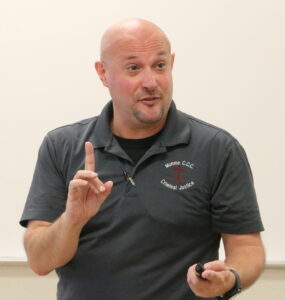Editor’s note: This version of the story has been corrected to show the acreage purchased for the expansion of the Whitman Center.
Assistant Professor of Criminal Justice Dan Wood said the criminal justice program at MCCC has been trying to get the MILO Immersive De-Escalation Simulator for almost two years.
The wait is coming to an end soon though, because MCCC has received a grant for $350,000, which was made available by Senator Gary Peters to purchase the simulator.

MCCC President Kojo Quartey announced the approval of the $350,000 earmark grant in his report at the March board of trustees meeting.
Wood said some of the efforts to get the funds needed to purchase the simulator included going on a local radio show, applying for multiple grants and pushed the request out to different political people.
“We got a few no’s and then a couple maybes,” Wood said, “and then Senator Peters sent one of his representatives to a live demonstration down at the Whitman Center, and he liked it so he said if he can get it in the budget, he would.”
Wood said Josh Myers, executive director of The Foundation, and Cajetan D’Cunha, grant writer and coordinator, were crucial in making this process happen.
“Josh Myers is really the finance guy for this,” Wood said, ” I have the ideas and he tries to find the money for me.”
Wood said D’Cunha helped him throughout the process to get the grant together.
According to a record of congressionally directed spending requests provided by Suzanne Wetzel, vice president of administration, part of the application for the grant from Peters included having letters from the community to show support of the project.
One such letter came from Todd Scheffler, the Chief of Police for the Trenton Police Department.
In the letter, Scheffler described why the MILO simulator was a worthwhile project and how the simulator has already been useful in different areas for training purposes.
MCCC also purchased a 3.36 acre parcel of land for $150,000 to expand the Whitman Center, according to a purchase and sale record provided by Wetzel.
Wood said he is moving the entire criminal justice program down to the Whitman Center. The first steps for expansion will likely be internal renovations to allow space for the MILO simulator and the needed classrooms.
At this time, neither an architect nor a contractor has been contracted out by the college for the renovations at the Whitman Center. Wood said his hope is that some of the work can be done by fall this year.
“I know my classes are going to be down there in the fall, and I know the money has to be taken possession of by September.” Wood said.
Wood said he is offering five classes for the criminal justice program at the Whitman Center this fall and is very excited to see how the program grows.

